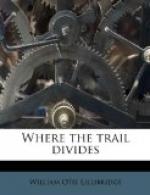For the third time Landor filled the pipe bowl and lit it with a fragment of coal from the grate.
“I don’t see why, How,” he refuted.
“You do, though, sir.”
“No. Tell me.”
There was a long pause, so long that Landor fancied the other would not answer; then of a sudden he found the intense black eyes fixed upon him unshiftingly.
“The reason is because not only Bess but others are human. As we are now I can make her happy, very happy. I know it because—I love her.” He paused, and into the tent there came the long-drawn-out wail of the baby prisoner. Silence returned. “As surely as that little wolf is lonely, Bess will know the trouble money brings if you do as you intend. Not myself, but other men will teach her.”
Landor was not smoking now. The pipe had gone dead in his fingers.
“Once more I ask why, How?”
The other’s eyes did not shift, nor a muscle of his body.
“Because she is white and they are white, and I—am an Indian.”
At last it had come: the thing Landor had tried to avoid, had hitherto succeeded in avoiding. Yet face to face the big man could ignore it no longer. It was true, as true as human nature; and he knew it was true. Other men, brothers of his own race, would do this thing—as they would do anything for money; and he, Landor, he who had raised her from a child, who had adopted her as his own daughter, he it was who would make it possible!
Involuntarily the big man got to his feet. He did not attempt to move about, he did not speak. There, standing, he fought himself inch by inch; battled against the knowledge of the inevitable that had been dogging him day by day, hour by hour. A long time he stood so, his great hands locked, his face toward the blank tent wall opposite; then at last he turned.
“I realise what you mean, How,” he said swiftly, “and understand the way you feel. God knows I wish it were different, wish I did not believe what you say true; but things are as the are. What we have to do now is the best thing possible under the circumstances.” He sat down in the chair again heavily, his hands still locked in his lap. “If wrong has been done I am to blame, I myself, in raising you and Bess together. I might have known that it was inevitable, you two here alone to care for each other; but I was poor then, and I never thought that Bess—”
“Mr. Landor—”
The big man halted. For the first time he realised the admission of what he had been saying, the inevitable implication—and he was silent. For seconds likewise the Indian was still; but in them he was looking at the other steadily, in a way he had never looked at him before, with an intensity that was haunting.
“So you, too, feel that way,” he said at last slowly. There was no anger in the voice, nor menace; merely wonder, and, yes, pathos—terrible, gripping pathos. “I knew that everyone else felt so—everyone except Bess herself; but you—you—I did not know that before, Mr. Landor.”




